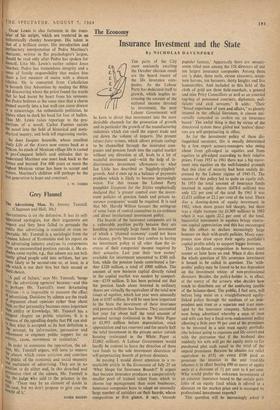Grey Flannel
The Advertising Man. By Jeremy Tunstall. (Chapman and Hall, 30s.)
Anvp.ansiNG is on the defensive. It has its self- appointed apologists, but their arguments are suspect and they have failed to persuade the Public that advertising is essential or even re- ,sPeetable. Mr. Tunstall is a sociologist from the London School of Economics and his report on the advertising industry analyses its components From an uncommitted position outside it. He ex- ?lodes some myths; e.g., that admen are not bril- liantly gifted people sold into serfdom, but are 4tore likely to be second-rate or, at least, in a' Job which is not their first but their second or third choice.
'A pall of failure,' says Mr. Tunstall, 'hangs i'ver the advertising agencies' because—and this 14 Perhaps Mr. Tunstall's most devastating eriticism--it is impossible to measure the effect °I' advertising. Deciiions by admen are the result of argument about opinions rather than about Facts, so that personality becomes more important „`"an ability or knowledge. Mr. Tunstall has a Pungent chapter on public relations. It is a measure of theAppalling depths that PR can sink ,1 that what is accepted as its best definition is the attempt, by information, persuasion and ,"
activity, to engineer public support for an ntivity, cause, movement or institution.'
In order to overcome the opposition, the ad- „
Mr. Tunstall argues, will have to remove the abuses which cause criticism and convince e Public of the economic and social necessity position usefulness of advertising. They are in no "sition to do either and, in this detached and Persuasive view of the admen, Mr. Tunstall is Ice the judge who said to the prisoner in the 'There may be an element of doubt in ), case, but we don't propose to give you the 'flefit of it.'
JAMES BREDIN






























 Previous page
Previous page